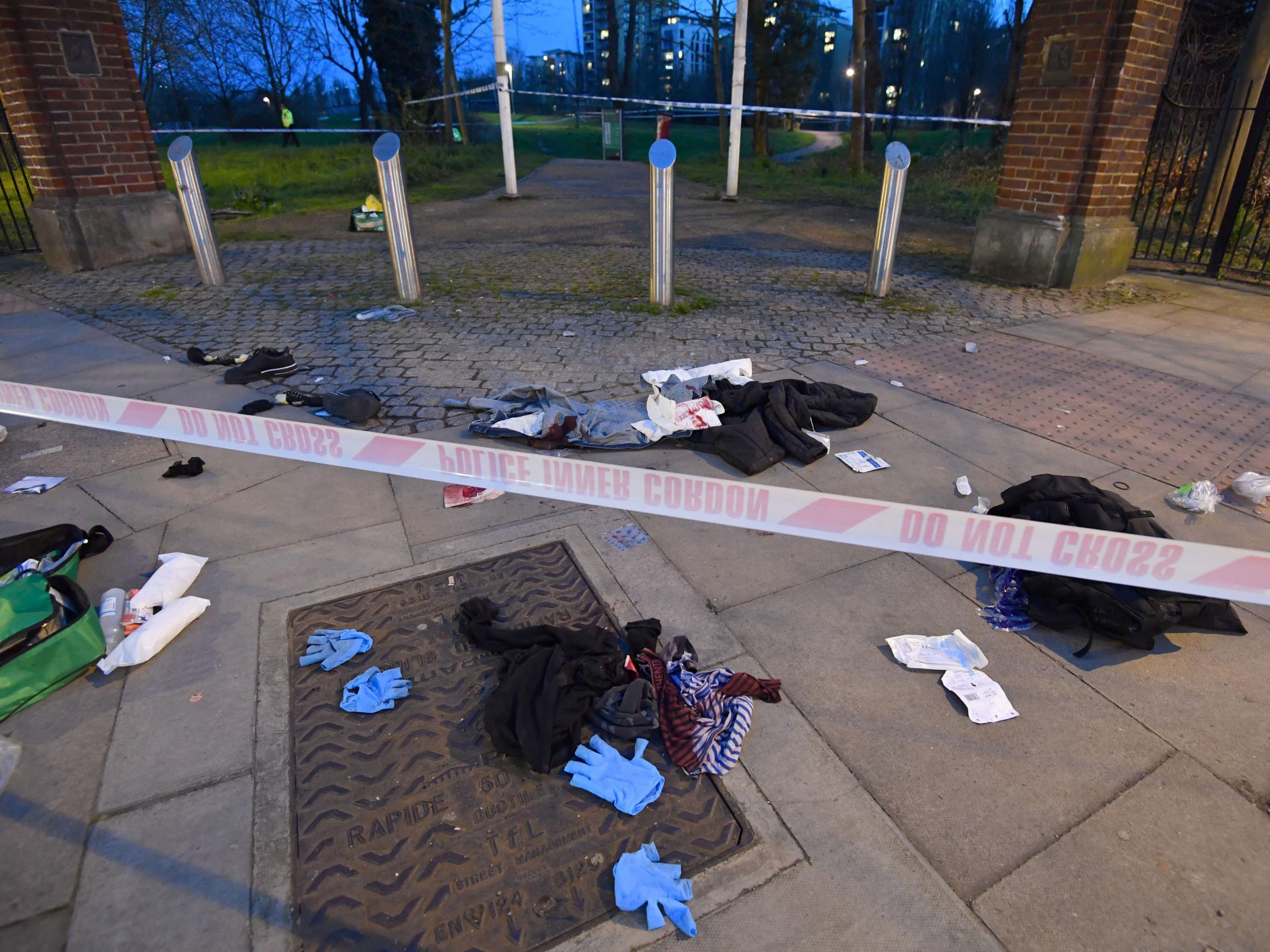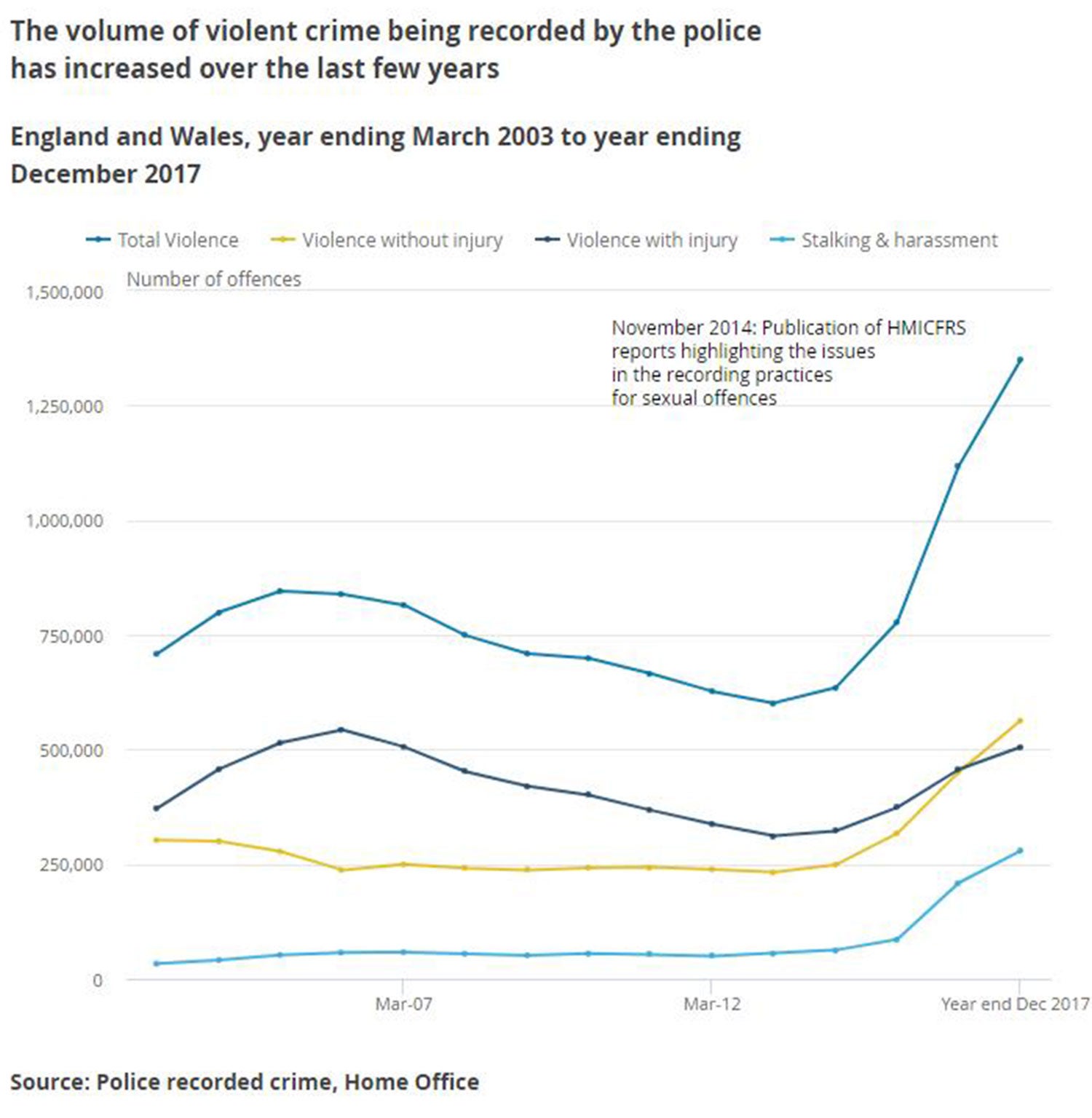Knife crime in England and Wales increases by largest margin ever, reveal official figures
Office for National Statistics warn of ‘genuine increase’ in violence after government attributes rise to improved recording

Knife crime rocketed by 22 per cent across England and Wales in the largest jump ever recorded, new figures have revealed amid a spate of stabbings in London.
Almost 40,000 offences involving knives or sharp weapons were recorded by police in 2017 – the highest level in seven years – while gun crime was up 11 per cent to 6,600 offences.
Alexa Bradley, an Office for National Statistics (ONS) analyst, said most crimes have remained fairly stable in the past year and at a much lower level than a peak seen in the mid-1990s.
“Eight in 10 adults had not experienced any of the crimes asked about in our survey in the latest year,” she added.
“However, we have seen an increase in the relatively rare, but ‘high-harm’ violent offences such as homicide, knife crime and gun crime, a trend that has been emerging over the previous two years.
“We have also seen evidence that increases in some types of theft have continued, in particular vehicle-related theft and burglary.”
The ONS told The Independent that the 22 per cent increase in knife offences was the biggest year-on-year rise on record.
Sexual offences recorded by police were up a quarter in the year, with rape increasing by 31 per cent to more than 50,000 offences, and domestic abuse-related crimes also up.
The Crime Survey for England and Wales, which is seen as the most reliable indicator of long-term trends, shows crime has fallen overall in recent years but the ONS warned of “genuine increases” in violence.

The crimes tend to be disproportionately concentrated in London and other large cities but the rise was seen by the majority of police forces in England and Wales in the year to December 2017.
The government has repeatedly highlighted improvements in the way police record crime and “proactive” operations, but the ONS said the changes did not fully account for the rise.
NHS hospitals in England have also been reporting rising number of patients arriving with knife and gunshot wounds.
Sarah Jones, chair of the all-party parliamentary group on knife crime, said the figures were a “damning indictment” of the government’s efforts.
“The only way we solve this is by a long-term commitment to a public health approach, and proper funding for police, youth services and communities,” the Labour MP added.
“All we got from the government’s recent violence strategy were empty words and very little resource or commitment.”
The latest statistics piled more pressure on Amber Rudd, who is facing calls to resign as home secretary over attempts to deport Windrush migrants.
There have been more than 60 murders in London alone since the start of this year, amid a spate of stabbings and shootings that saw two teenagers shot dead in one night earlier this month.
In the year to March, homicides rose by 44 per cent in London according to the Metropolitan Police’s own figures.
Knife crime in the capital was up by 21 per cent in the same period, but gun crime fell by 4.6 per cent.
London also saw an 11 per cent rise in recorded sexual offences, 18 per cent rise in rape and 12 per cent increase in burglary.
Robbery has rocketed by a startling 36 per cent, which Scotland Yard attributed partly to the use of scooters in muggings – a technique that peaked in July.
Assistant Commissioner Martin Hewitt said he was concerned about the figures against the backdrop of “significant reductions in resources”.
”My thoughts are with the victims’ families of these tragic and horrific crimes which have brought untold misery to countless people,” he added.
“We are doubling our targeted anti-knife crime activity with hundreds more officers on visible patrols in affected communities.
“But despite our continued focus on reducing knife crime, prevention and diversion will always be key. There are complex social reasons why more young people are carrying knives and we have been absolutely clear that knife crime cannot be solved by the police alone.”
Other measures outlined by the Metropolitan Police include increasing stop and search and weapons sweeps, putting dedicated officers in electoral wards and working with a new government taskforce.
The group, including ministers, police chiefs and anti-gang crime campaigners, was one of the measures announced as part of the government’s first ever nationwide strategy against serious violence.
But the document released earlier this month was heavily criticised after failing to mention huge drops in police budgets and officer numbers, which plummeted to a record low last year.
A leaked Home Office document suggested that cuts had “likely contributed” to rising violence and “encouraged” offenders, as well as county lines drug dealing and postcode wars between rival gangs fuelled by social media.
The National Police Chiefs’ Council said the figures were “deeply concerning” and forces were under strain.
“Tackling violent crime isn’t something police forces can do alone – it requires a whole system approach,” said chief constable Bill Skelly, the lead for statistics. “Intervention is desperately needed to make long-term change.”
Reductions in youth services by squeezed local authorities have been cited as a driver of violence and criminality.
The YMCA said council spending in the area had fallen by more than £750m since 2010/11 across England and Wales, with the West Midlands and North West hardest-hit.
Denise Hatton, chief executive of YMCA England and Wales, said the vital services are necessary to provide teenagers with positive activities, help them develop, meet new friends and socialise.
“Unfortunately it is not until news of young people’s loneliness or incidents like the recent knife crimes in London hit the headlines, the role of youth services is in the spotlight,” she added.
“Without drastic action to protect funding and making youth services a statutory service, we are condemning young people to become a lonely, lost generation with nowhere to turn.”
Nick Hurd, the policing minister, said the government was taking “urgent action” against violent crime.
“We will be announcing tough new laws to crack down on acid attacks and knife offences,” he added.
“And as crime changes, we will change our response – our Serious Violence Strategy places a new emphasis on steering young people away from a life of crime, while continuing to promote the strongest possible law enforcement response.”
